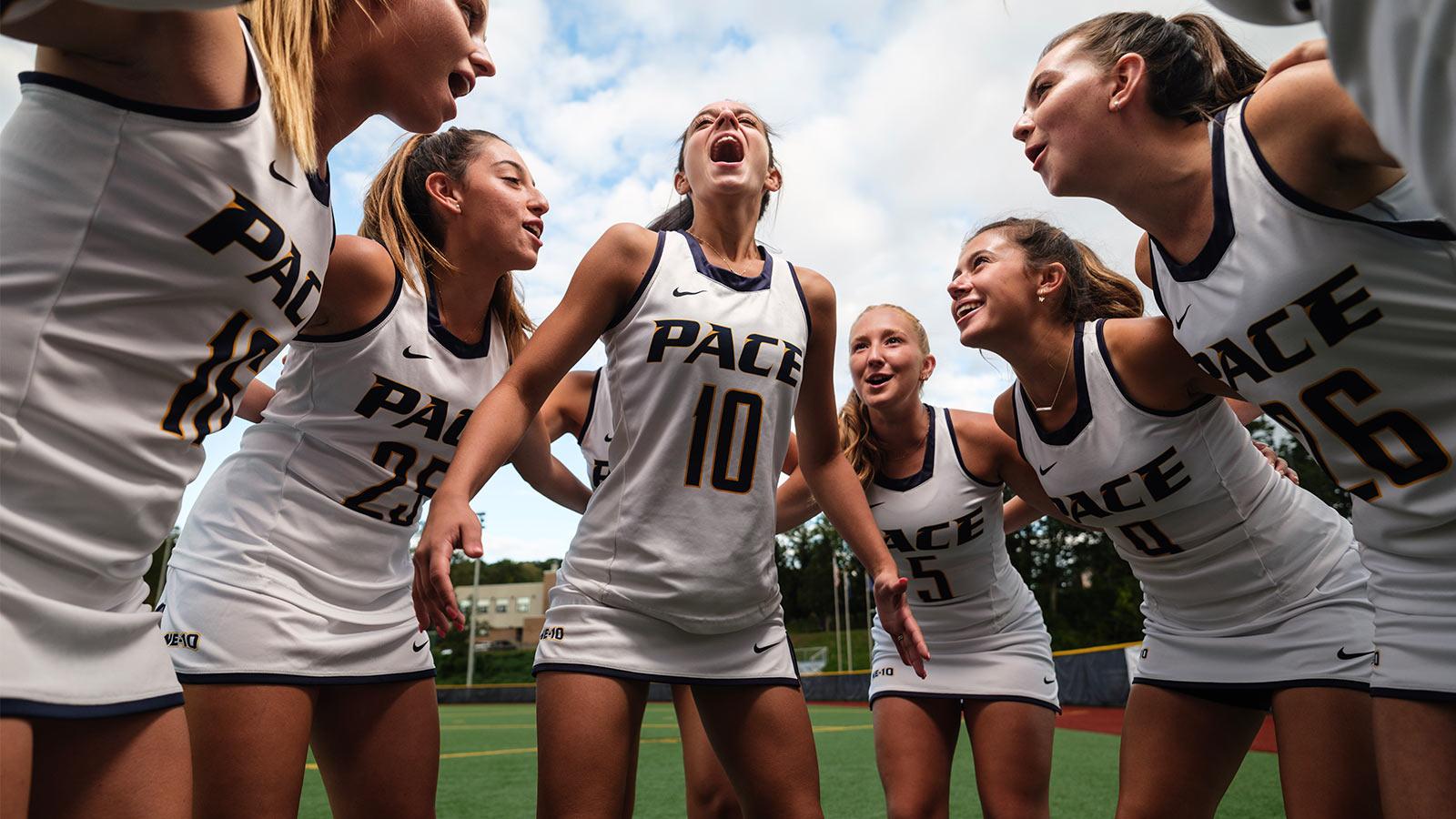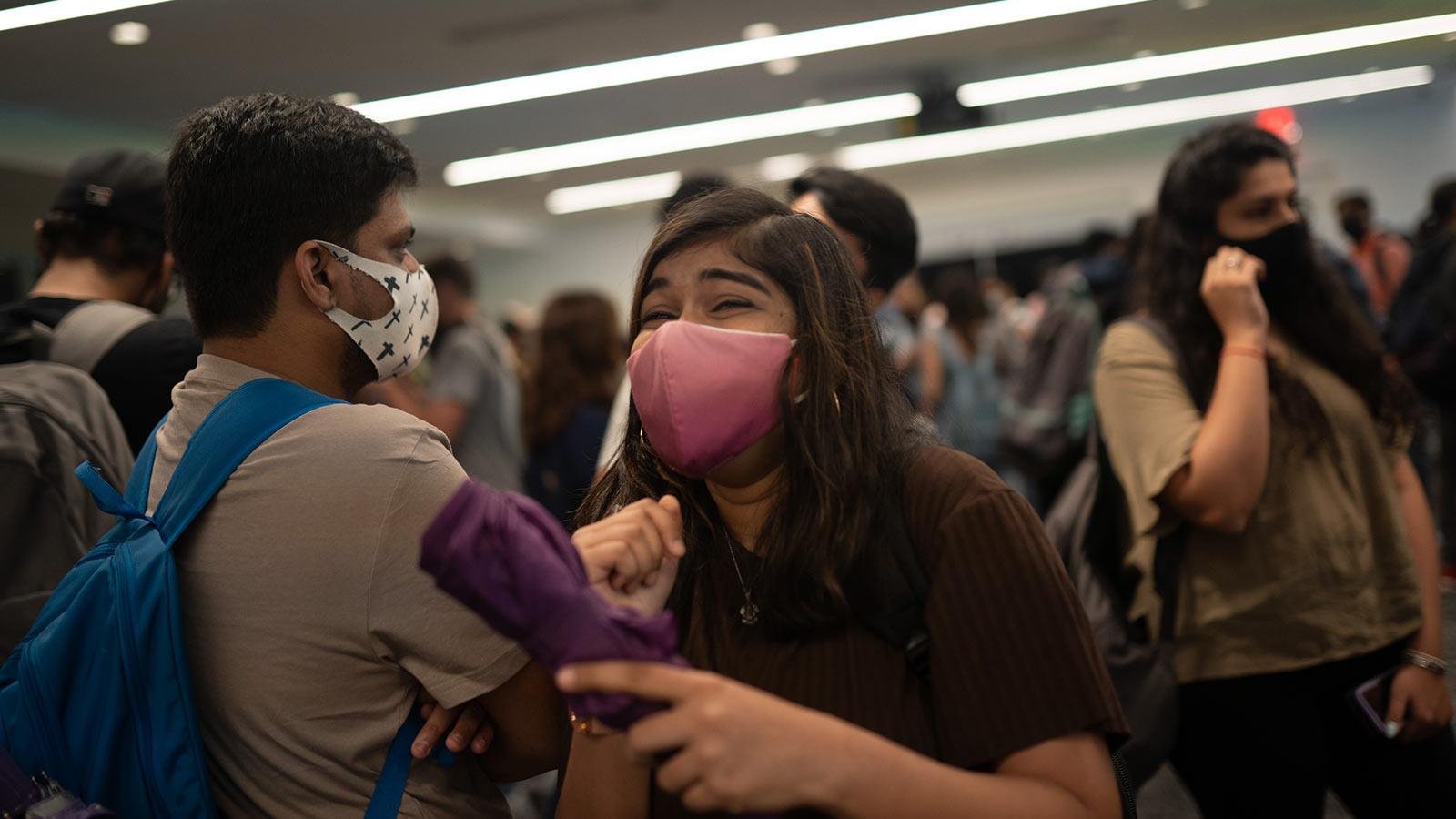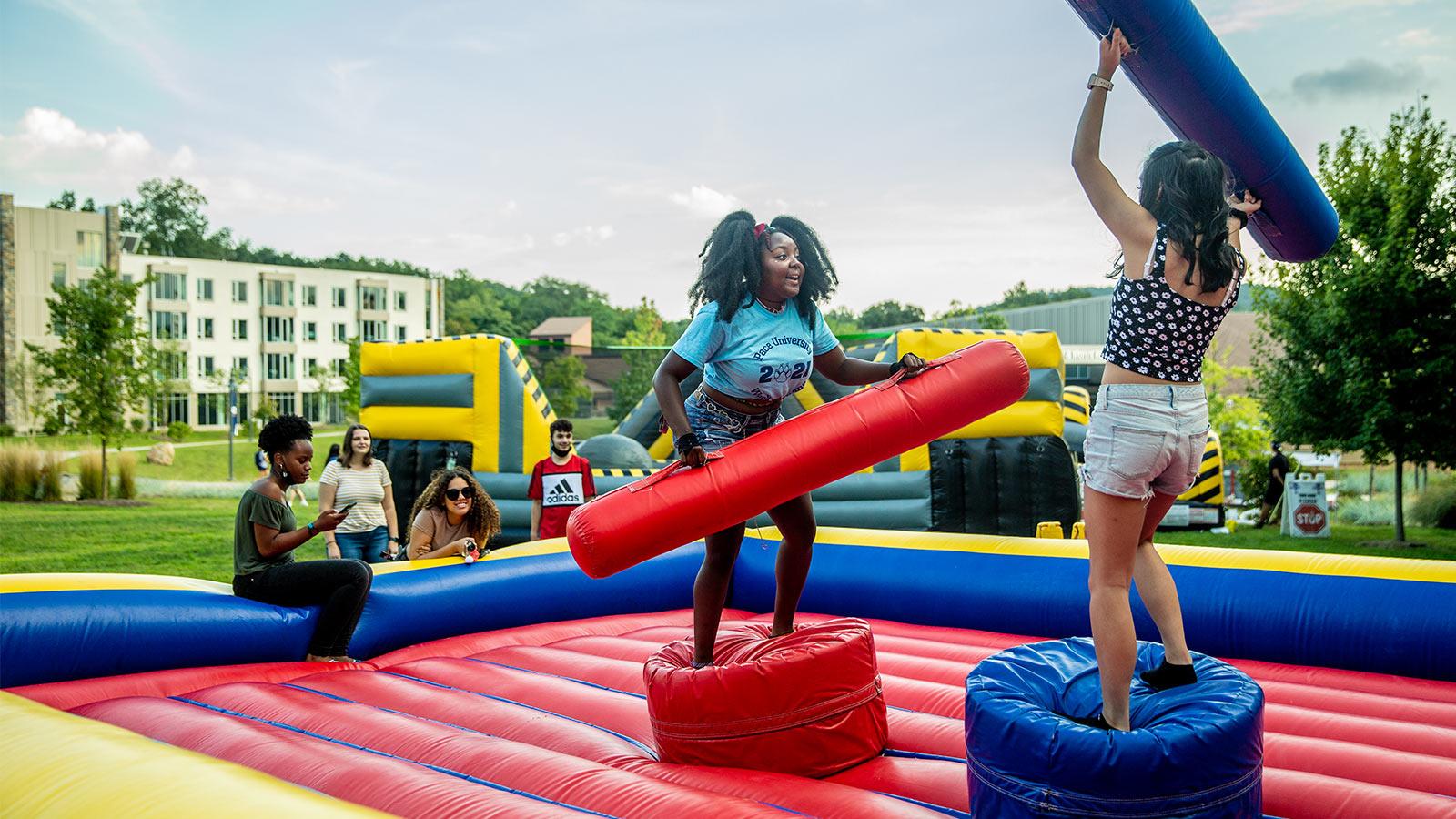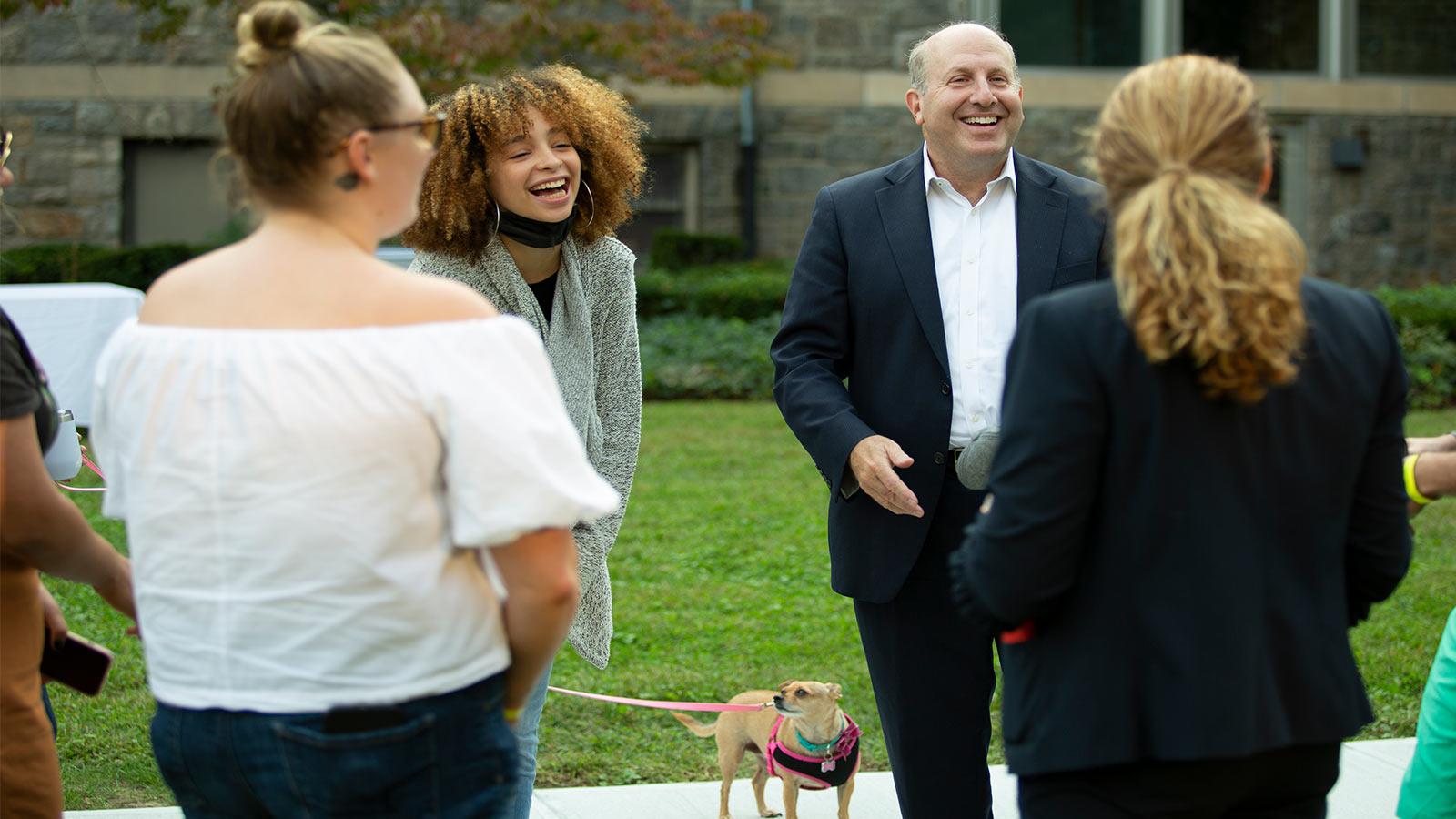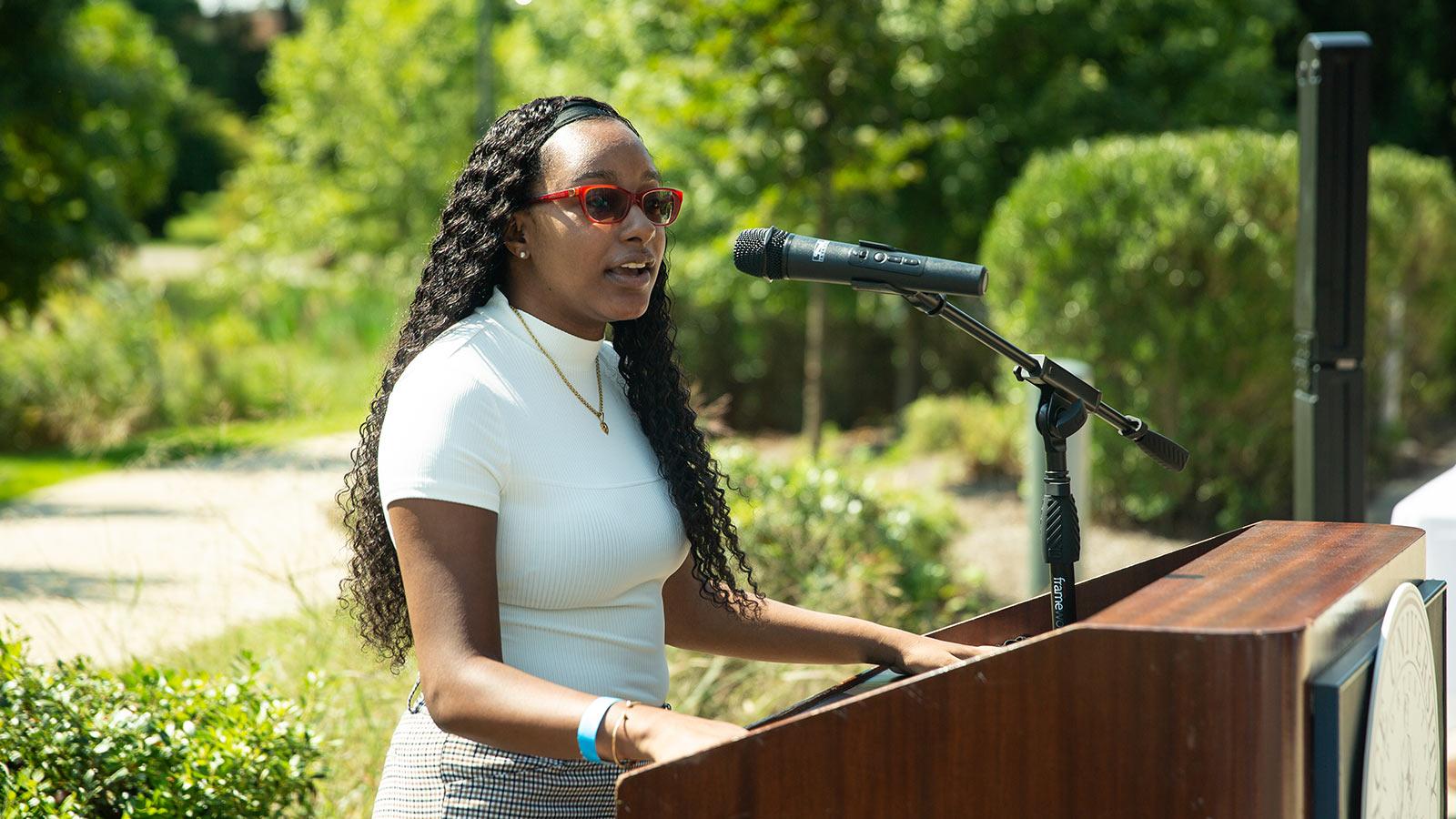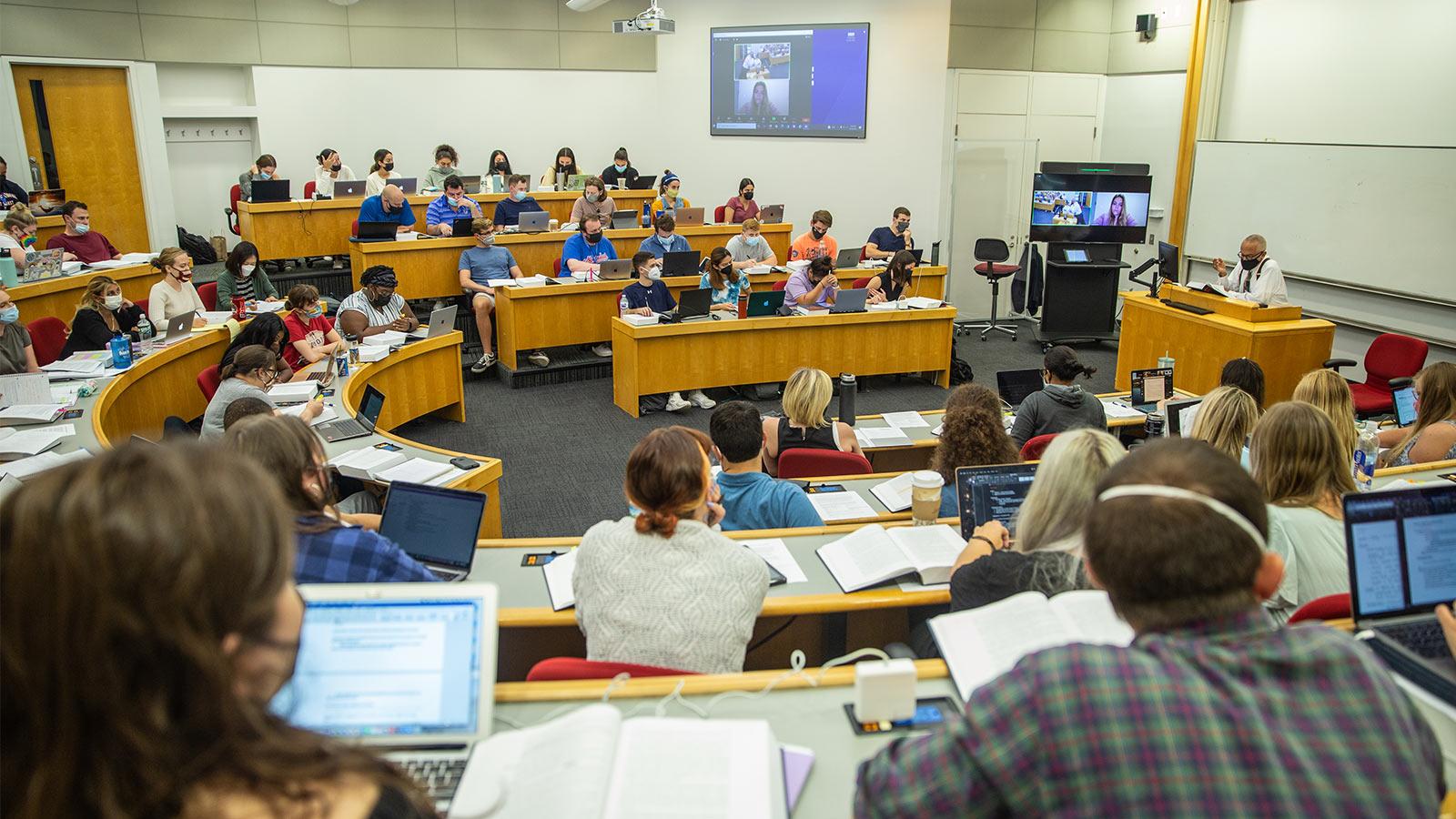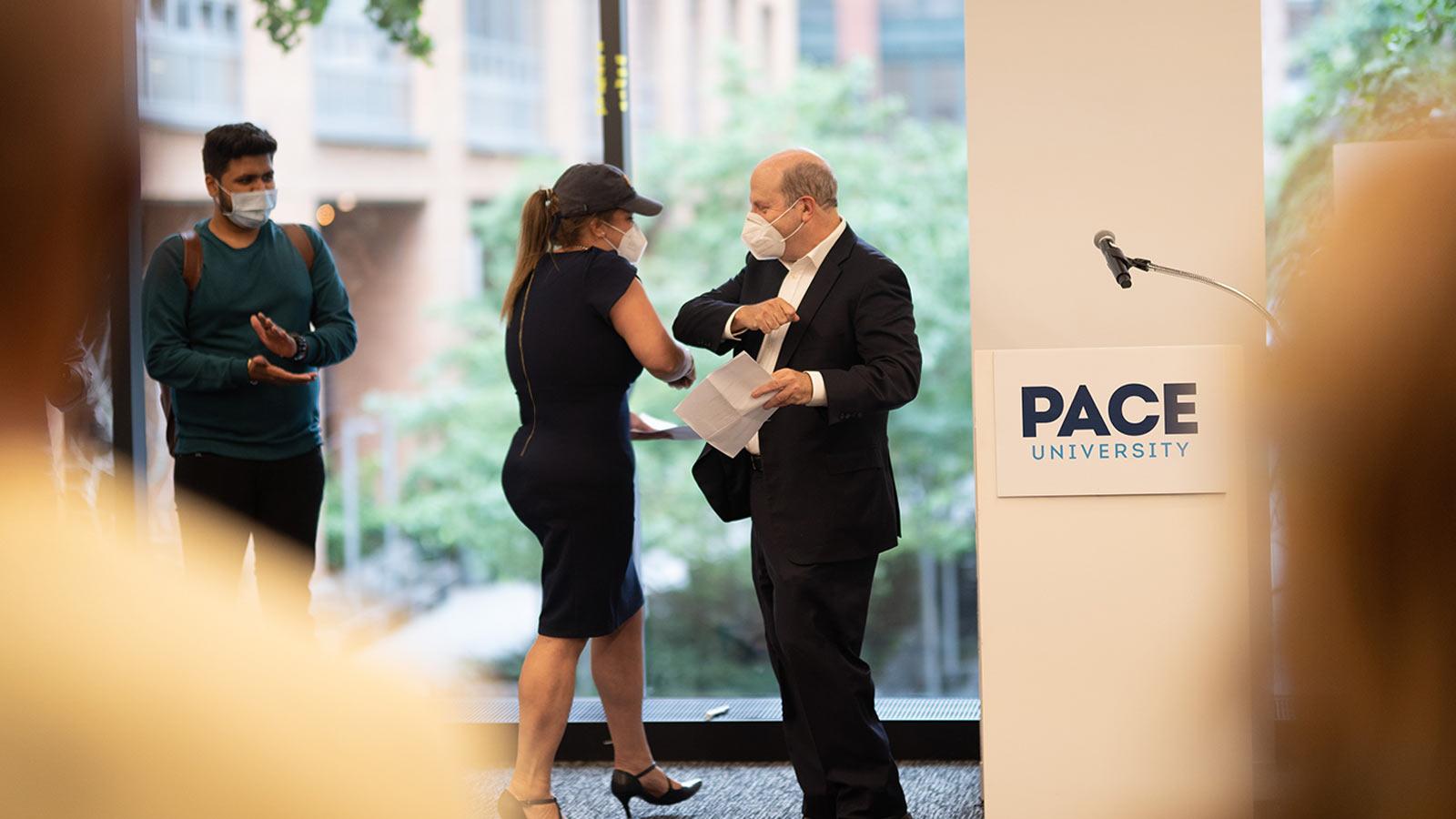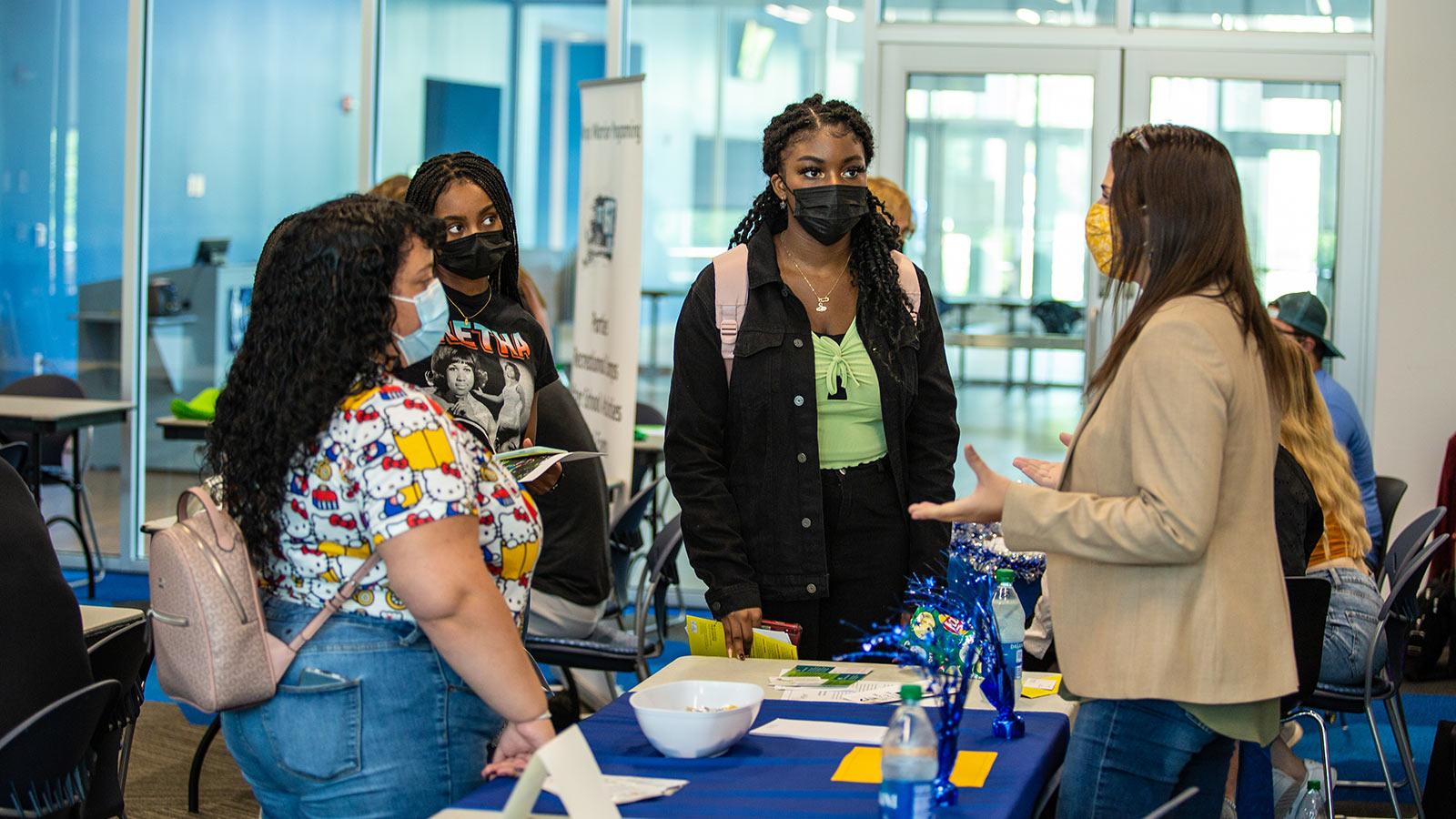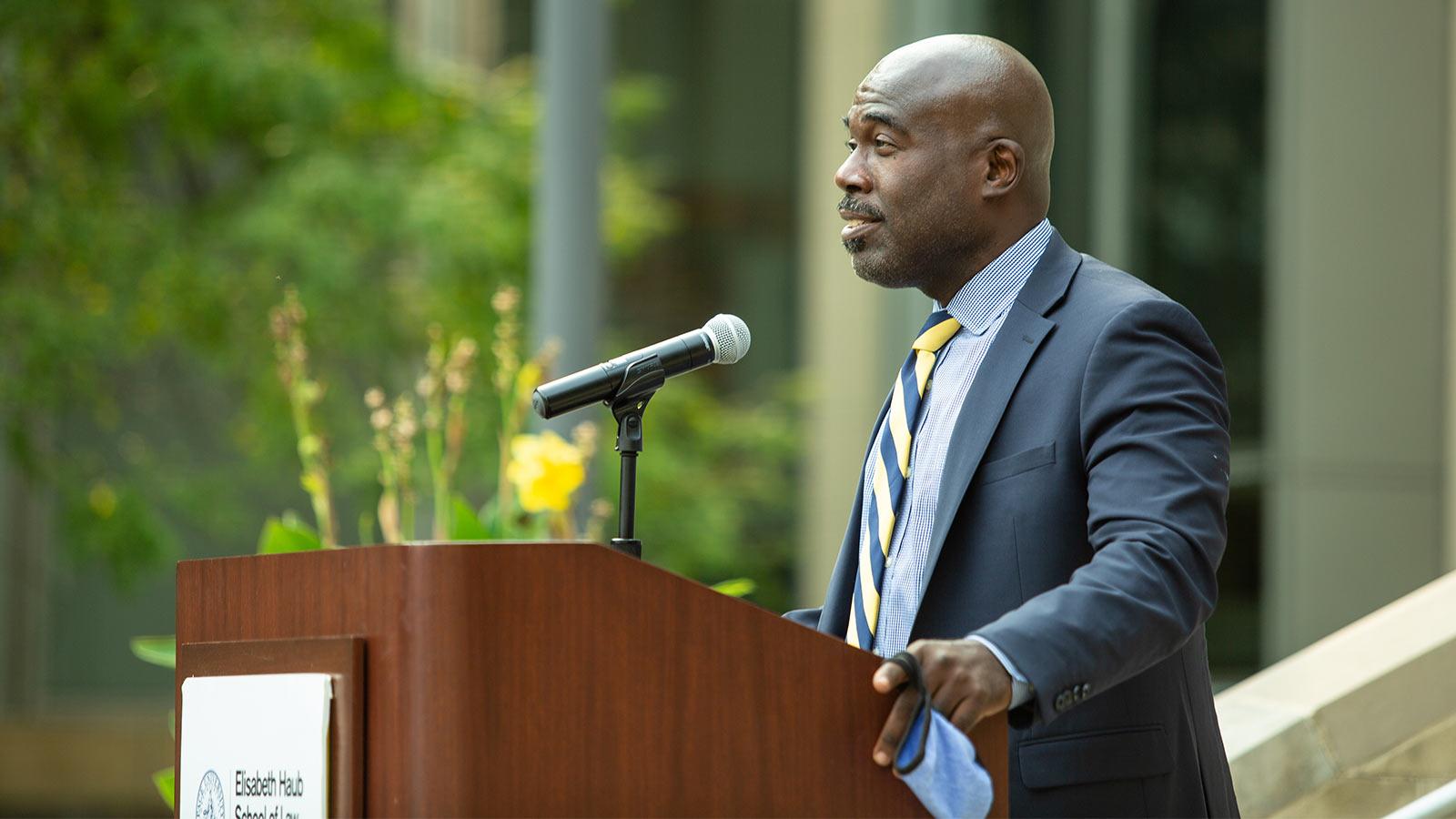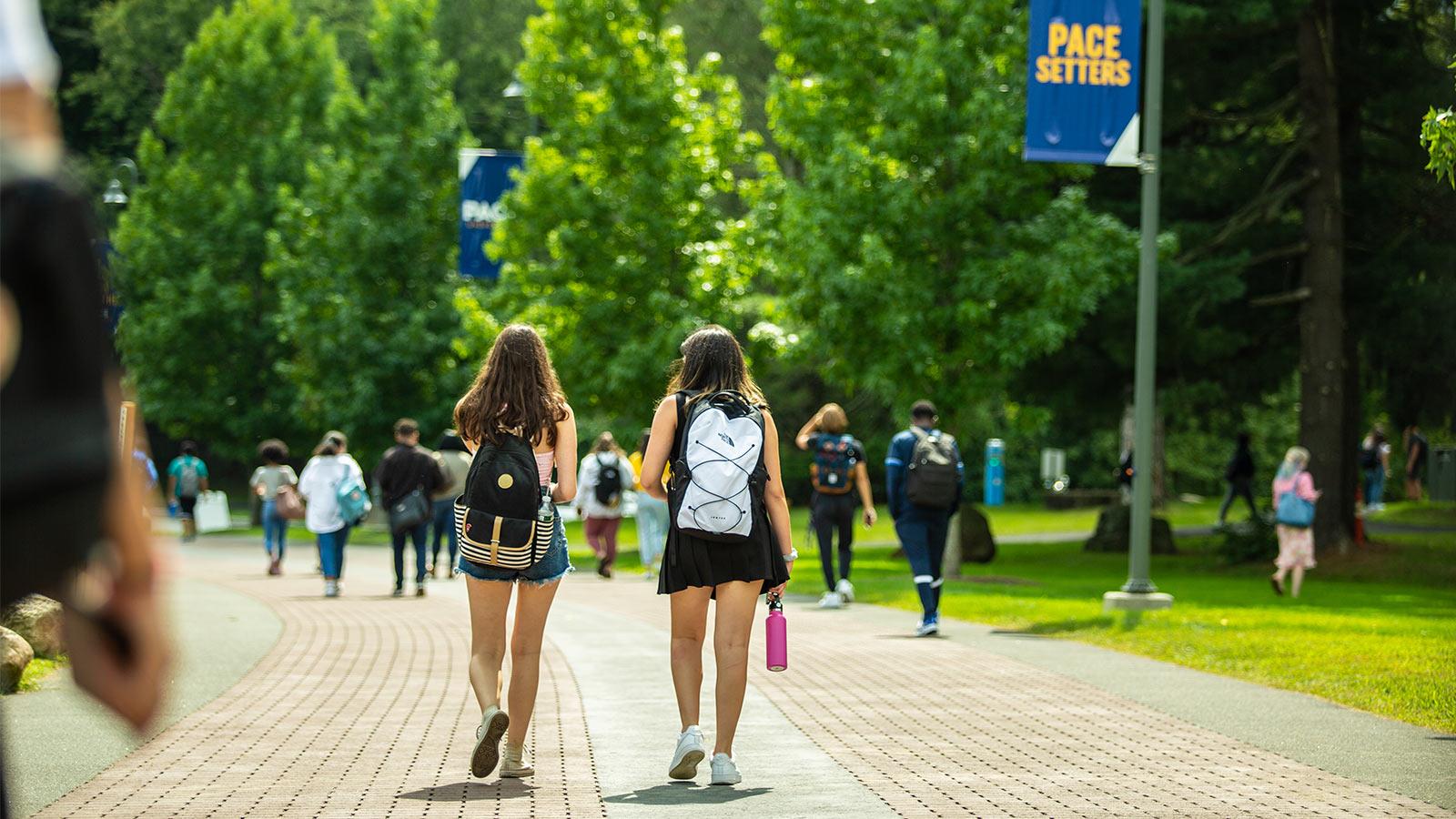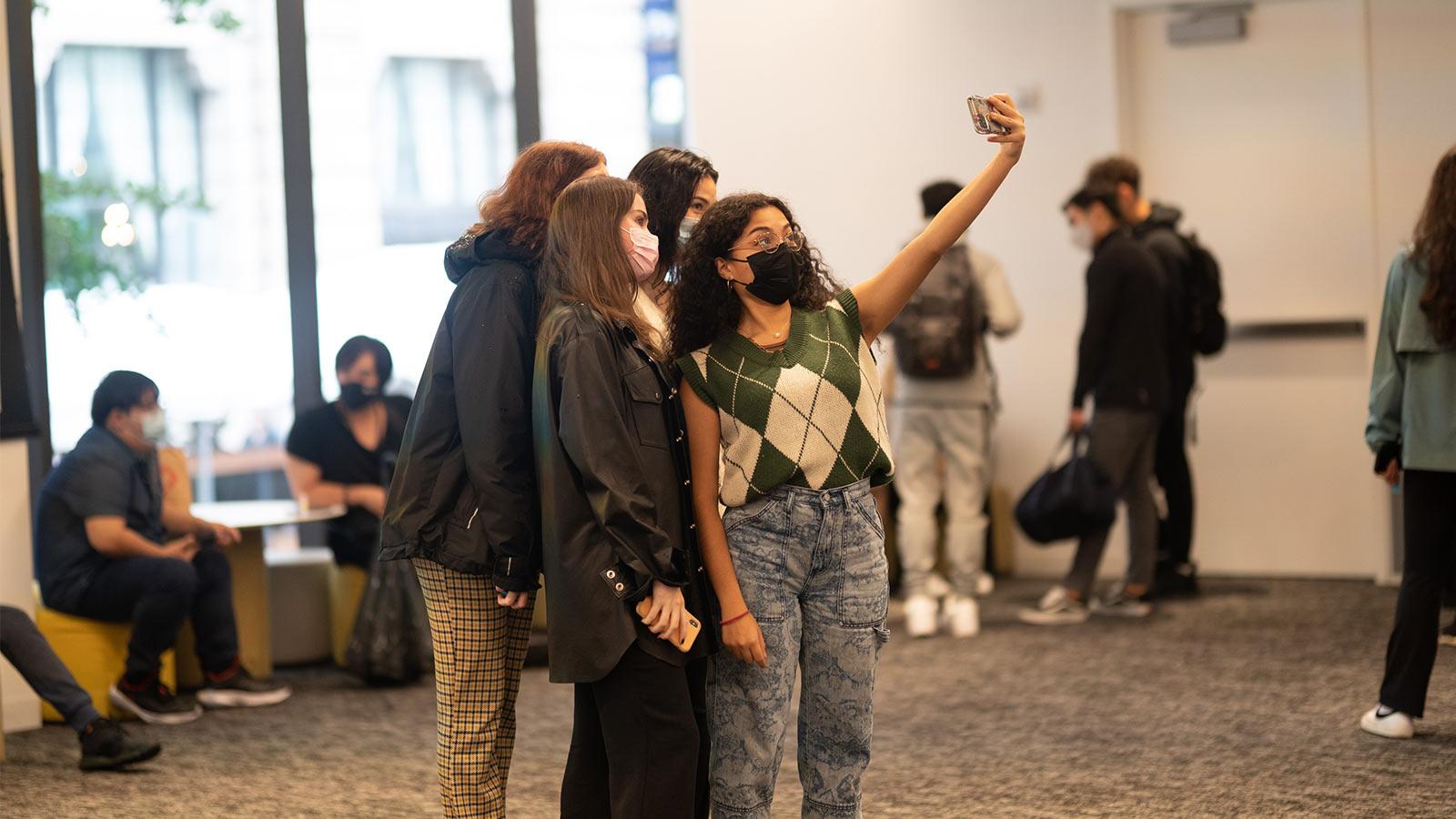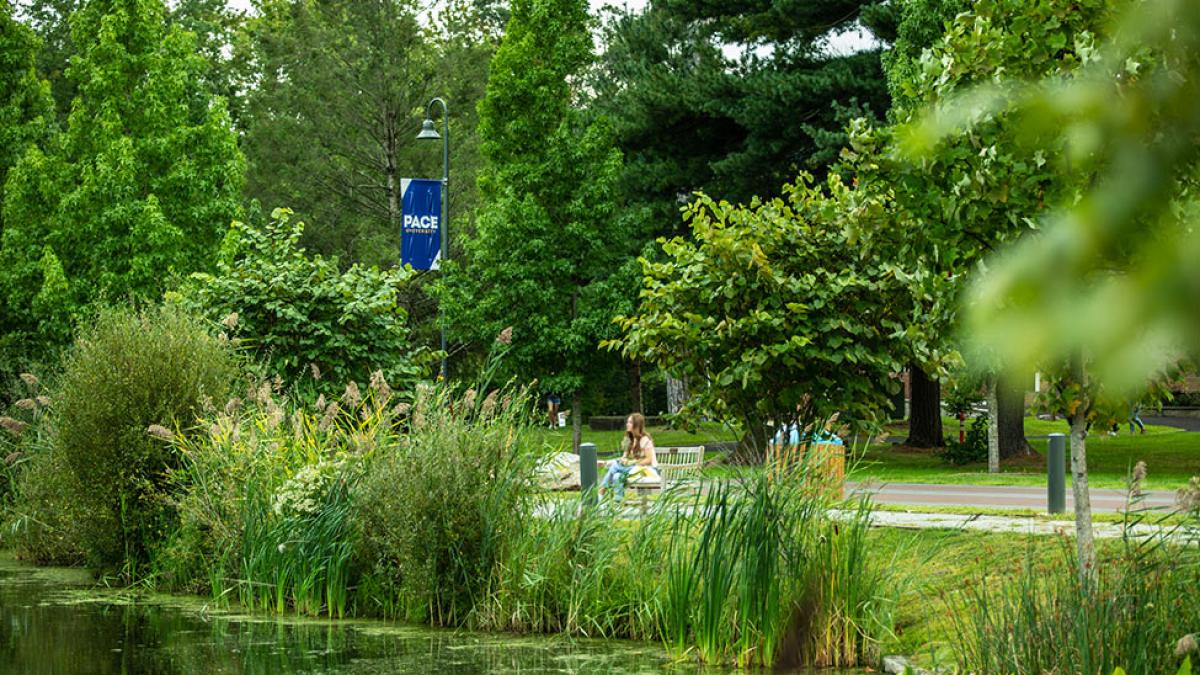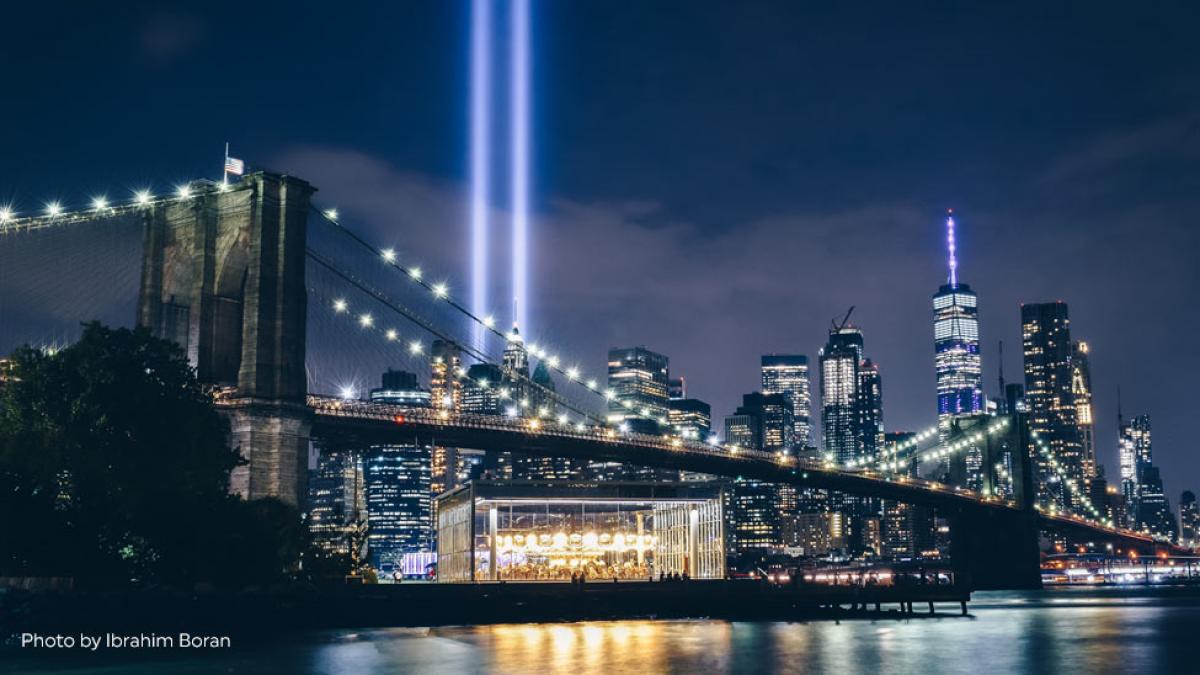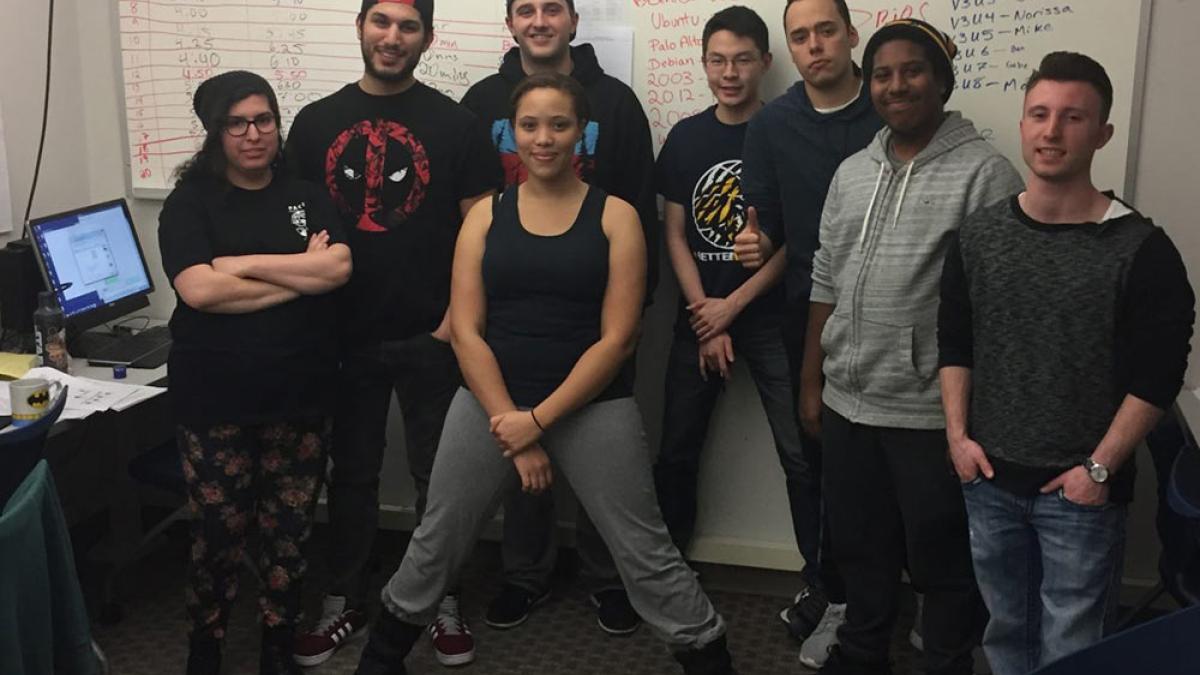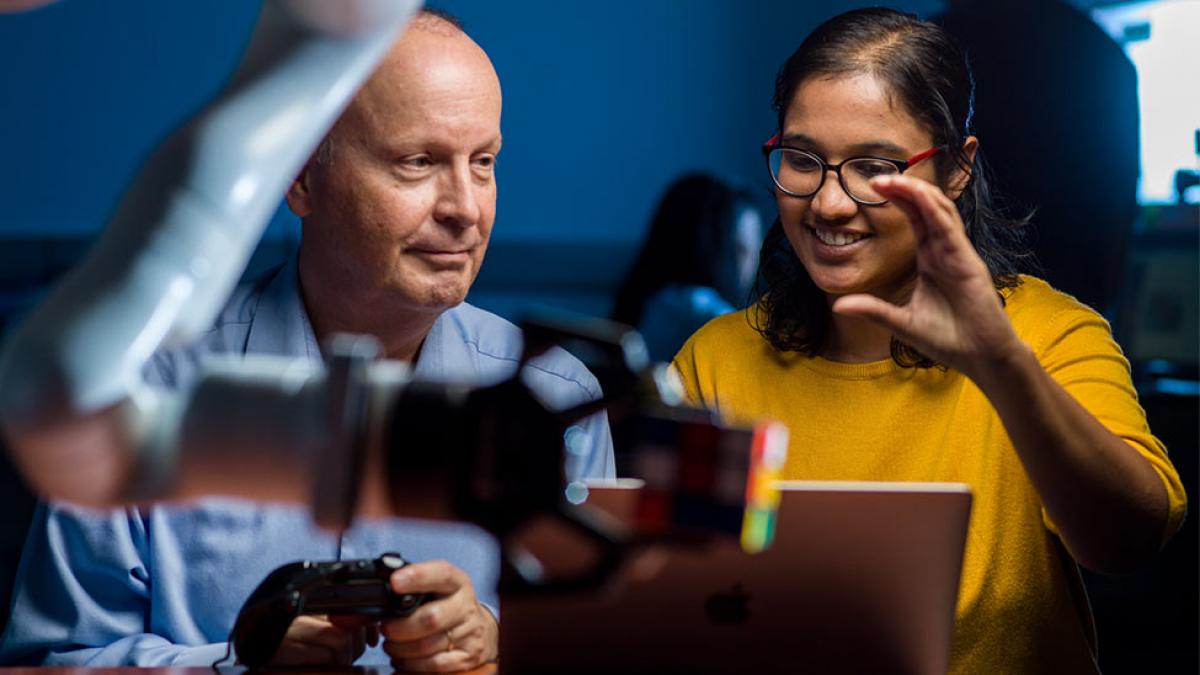For 12 years, Pace has been supporting neurodiverse students and students on the autism spectrum through its Ongoing Academic Social Instructional Support (OASIS) program. This year, through initiatives from the President and Provost’s offices, OASIS has expanded its services to the Pace Community in Westchester.
New York Is Back
A return to normal never felt so good! Pace's campuses are buzzing with activity and New York is coming alive after nearly two years of life during a global pandemic.

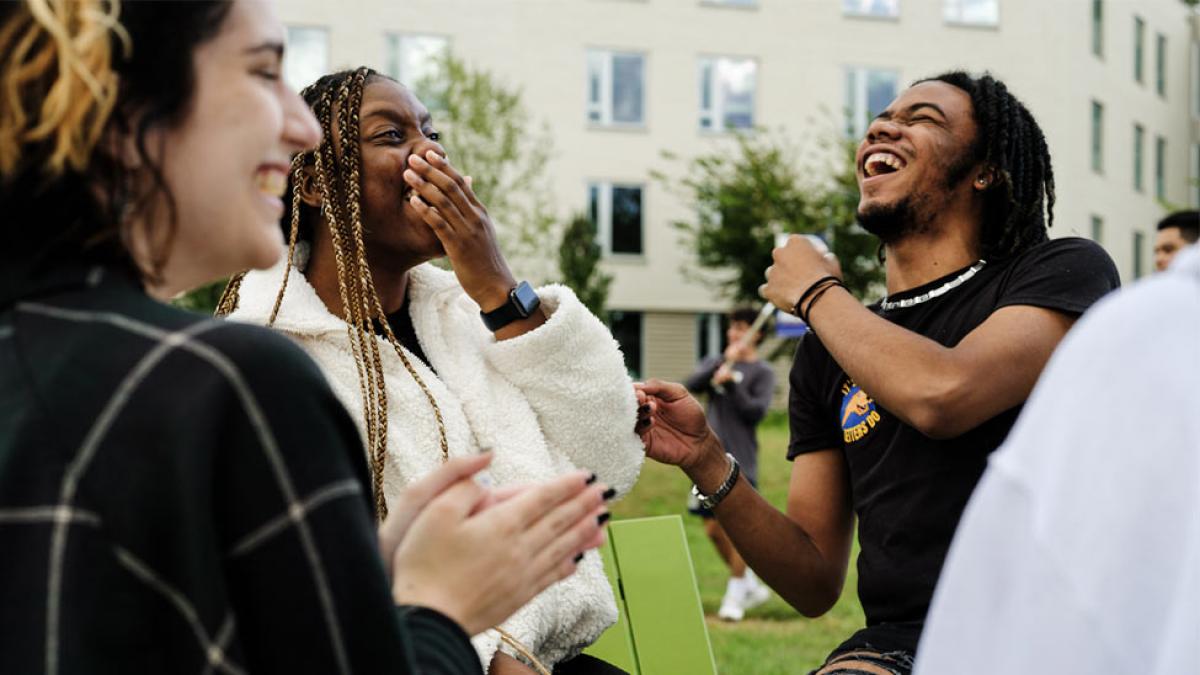
A return to normal never felt so good! Pace's campuses are buzzing with activity and New York is coming alive after nearly two years of life during a global pandemic.
On campus, our students have returned to classrooms, our faculty are once again at the head of the class, and Pace is beginning to feel a bit more...normal. Check out the gallery below to see some of the great moments we captured early in the start of our Fall 2021 semester.
Pace in Pictures
More from Pace Magazine
Rob Sands ’84, president and CEO of Constellation Brands, brings his visionary leadership to Pace as its newly appointed Board of Trustees Chair.
The Lubin Center for Sustainable Business is equipping students, faculty, professionals, and communities with education, research, and the job skills necessary for maintaining sustainable business models in the 21st century.
The Media Marketing Veteran
Meet Steven Montesantos '19,'21, a double Lubin graduate currently participating in the Veteran Immersion Program at ViacomCBS who balances his busy student life with a passion for sailing.
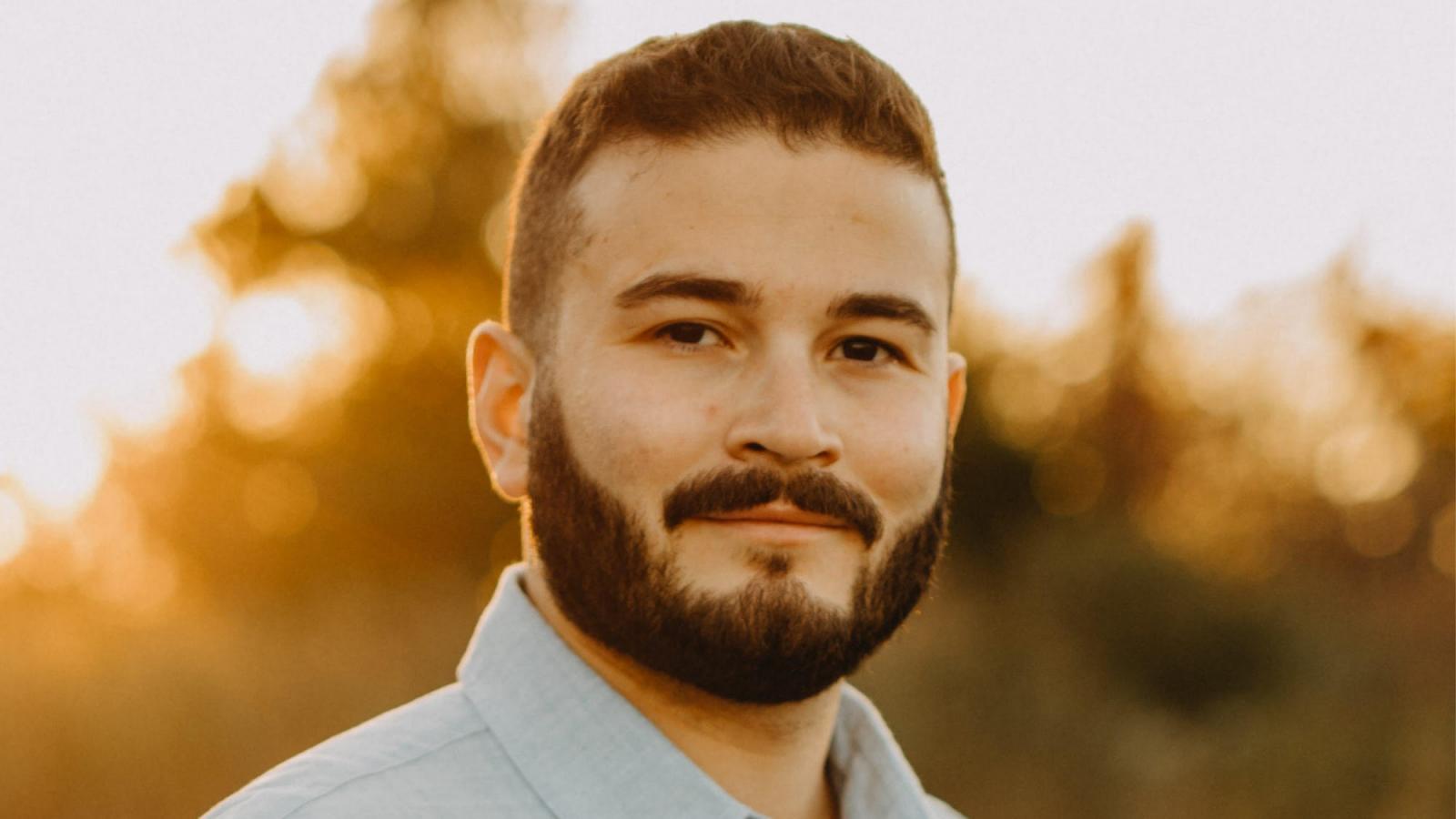
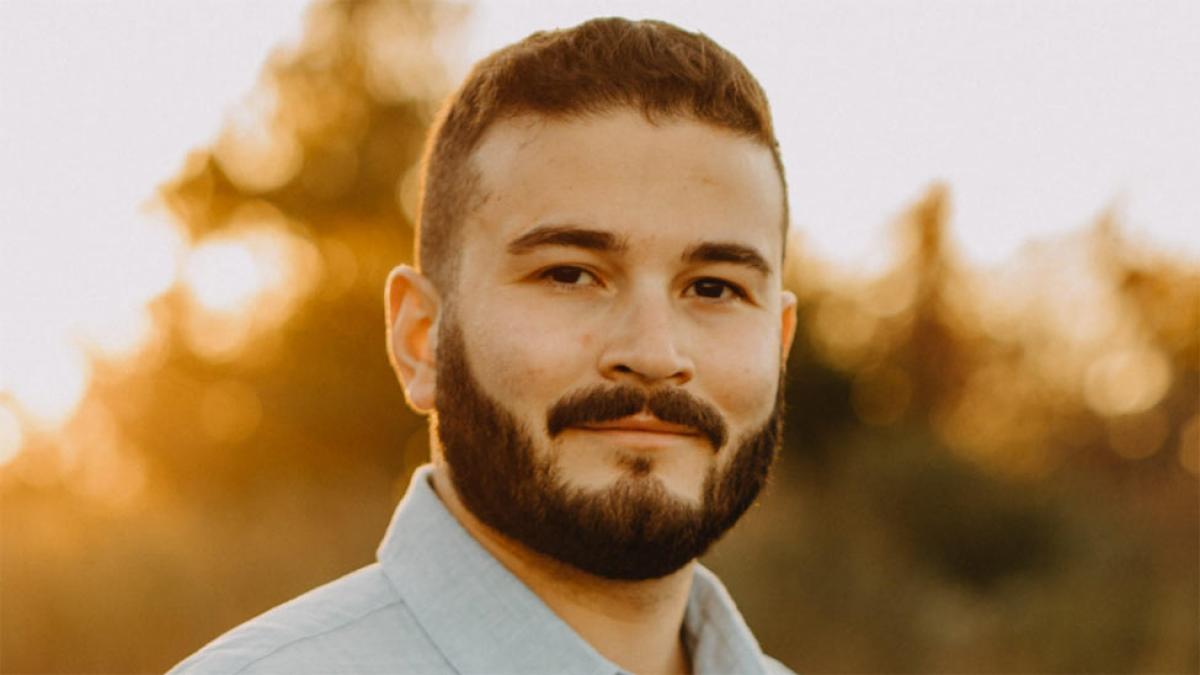
Steven Montesantos
Senior Associate, Management Consulting M&A, RSM
Class of 2019, 2021
MBA in Marketing Management
Member Of: Student Veterans of America, Zeta Beta Tau, American Marketing Association (AMA), Veterans in Media & Entertainment (VME)
Meet Steven Montesantos, a double Lubin graduate currently participating in the Veteran Immersion Program at ViacomCBS. This Marine Corps veteran balances his busy student life with a passion for sailing. He has been a member of multiple student organizations, has participated in case competitions, and has maintained an active relationship with Career Services, his Lubin professors, and his classmates. As a member of the Student Veterans of America (SVA) Leadership Institute—which only accepts the top 1% of student leaders who join—Steven is currently preparing to be a speaker at the SVA National Convention. He has even landed a second internship with ViacomCBS' Integrated Marketing Activation Team for Nickelodeon and has more than one full-time offer to choose from after graduating in December 2021.
Why did you choose Pace University and the Lubin School of Business to advance your education?
After earning my associate’s degree from Nassau Community College, I considered many universities where to pursue my bachelor's degree, but a few things about Pace University stood out. First of all was the location. Although it seemed more glamorous to go to a university with a lustrous campus and vibrant dorm life outside of the city, my goal was to position myself in a location that afforded me the best path to multiple opportunities. The second thing that differentiated Pace among other universities is the reputation of the Career Services department. I've heard many current students and alumni consistently sing the department’s praises. The third reason I chose Pace is because of its arsenal of tried-and-true professionals at the Lubin School of Business. Fourth, I chose the university because of its Veterans Services Office and the tremendous support it has for its veteran students. The cherry on top is that Pace is my father's alma mater (Class of 1980).
You are part of the Veterans Immersion Program at ViacomCBS. Tell us about some of your experiences.
I was truly honored to be selected for this program. The content of this program has been a lot to take in, in such a short time, but the experience is like none other. Immediately you're brought on to projects and given a first-hand view of how the nation's largest media network company operates. I've had the privilege of meeting many leaders within the company and had the opportunity to exchange experiences and stories with them, which has been motivating, impactful, and memorable.
"If it weren't for Career Services, this opportunity would have never presented itself. Not only did Career Services help me put together a flawless resume, but they also prepared me for interviews and future career success.”
How did you land such a fantastic opportunity? Was it with help from Career Services?
Absolutely. If it weren't for Career Services, this opportunity would have never presented itself. Not only did Career Services help me put together a flawless resume, but they also prepared me for interviews and future career success. Career Services invited ViacomCBS to attend the Career Fair. Although I could not meet with representatives from the company during the event, Career Services still connected me to the recruiters afterward, which led to an interview. Career Services then came through for me again, this time with RSM, which led to an offer letter for the position of Strategic Management Consultant: Mergers & Acquisitions, Senior Associate.
You have a go-getter attitude and get involved in many projects and extracurricular activities, including case competitions. What advice do you have for other students looking to get involved?
I can't stress this one enough: Use your time wisely and take advantage of various resources during your tenure at Pace University; you are paying for it! You only get so many years of college, so make the most of them. There are a myriad of astounding and insightful professors and staff eager to help you achieve your goals. Further, make sure you surround yourself with like-minded students who are motivated and committed to personal growth. Lastly, join a club! There are so many clubs and organizations at Pace that have valuable resources and connections at their disposal.
What types of impactful relationships have you built while at Pace?
Joining the Zeta Beta Tau (ZBT) fraternity has vastly expanded my network with not only a phenomenal group of friends and brothers on campus, but outside of Pace as well. Our alumni network and other ZBT chapters at different universities such as Columbia, City College, and Brooklyn College are always reaching out to offer their help. I've also found that my Lubin classmates are much more than just classmates; they are more like business partners or colleagues. I am still close to many of them today. And of course, there are the many professors at Lubin who have made an everlasting impact, as well as guided and mentored me during my time at Pace.
What does #LubinLife mean to you?
#LubinLife implies that I'm motivated and committed to personal growth and success. It represents a culture of young professionals with an unyielding drive for competition. It is comprised of a network of professionals, executives, forward thinkers, and individuals who aren't afraid to try. #LubinLife is full of faculty and students who will help you take advantage of great opportunities.
10 Things to Inspire You
Leading the way forward-looking academics, moving up in the rankings, and showing that New York has massive heart, here are our top 10 things to inspire you.
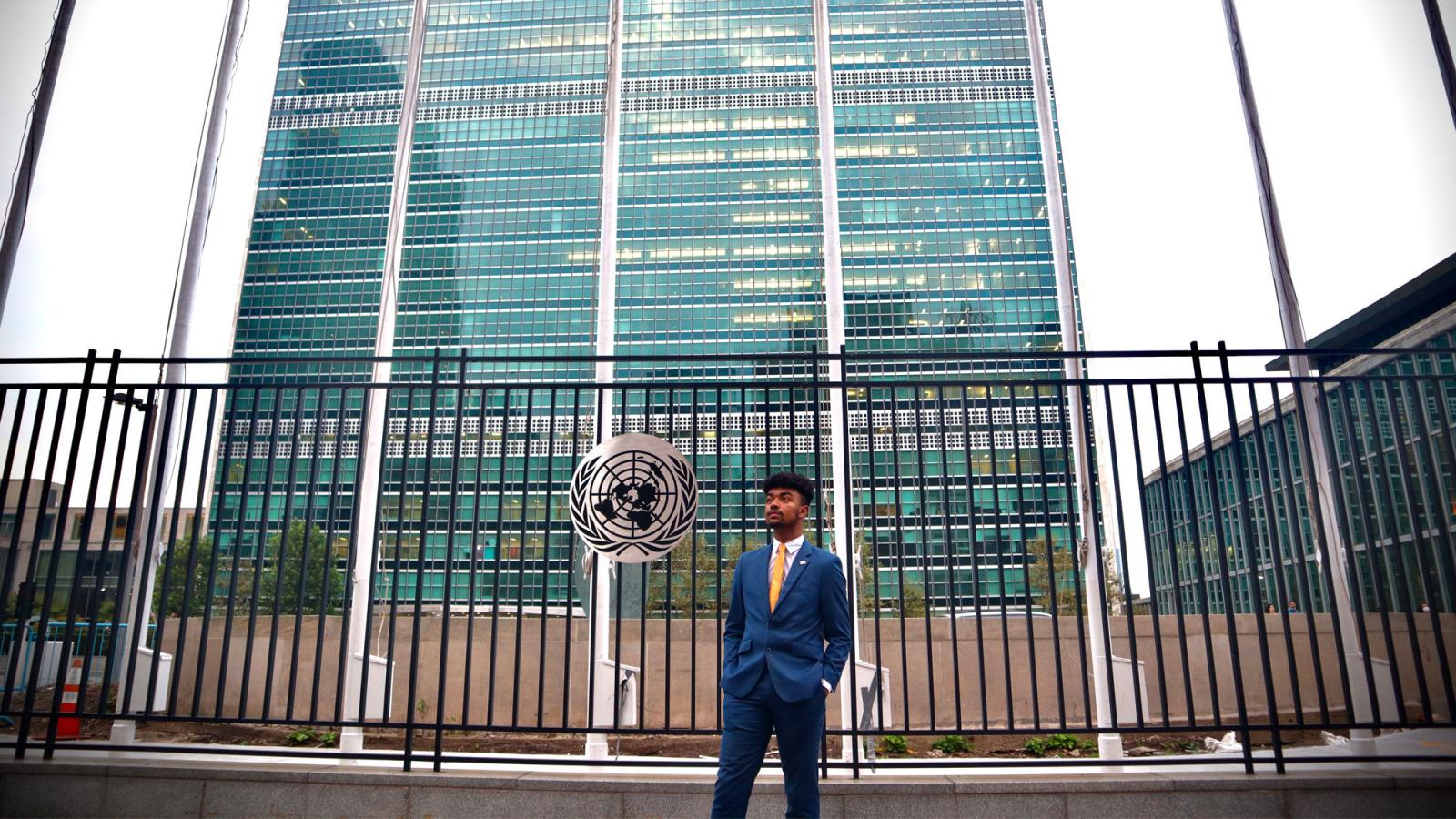
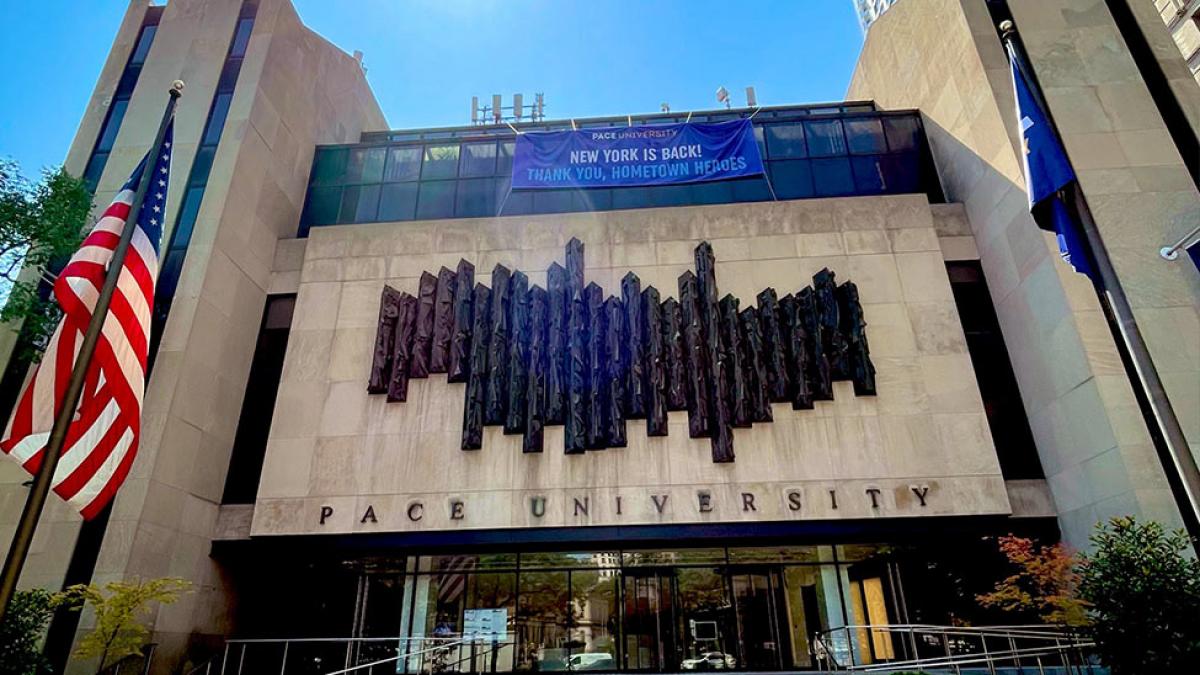
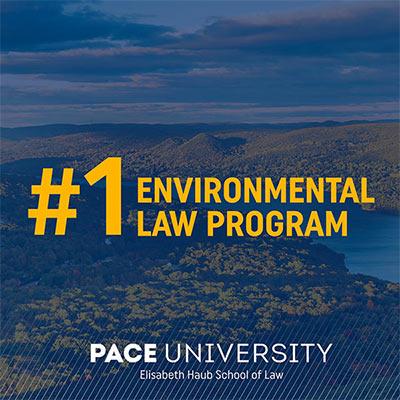
1. We’re #1!
If you’re looking to make an impact in environmental law, there is no better place to be than our Elisabeth Haub School of Law, which U.S. News & World Report crowned number one in the country for environmental law in their latest rankings.
“For decades our environmental law program has led the way in training environmental defenders and advocates who have gone on to serve in law firms, government agencies and NGOs around the world,” said Dean Horace Anderson. “We are proud that the faculty scholarship, teaching quality and the experiential learning opportunities we provide our students are recognized at the pinnacle of the field.”
2. Leading the Way in Nursing

Our College of Health Professions recently received the prestigious Workforce Diversity grant, funded through the U.S. Health Resources and Service Administration. The grant, which totals nearly $2 million will enable Pace to address the current nursing shortage and is designed to increase educational opportunities and retention rates for first generation college students from underrepresented ethnic and minority groups.
“Pace University has always been about creating opportunities for its students,” said Provost Vanya Quiñones. “These funds will go a long way in helping students start a rewarding career in nursing while helping our communities provide critical care practitioners that are the backbone of our healthcare system.”
3. A Bingeworthy Watch
Looking for something to binge watch this long weekend? We've got you. Lubin alumna Jo Franco '14 is hosting a new travel show on Netflix called The World’s Most Amazing Vacation Rentals. Jo got her start with fellow Pace alumnus Damon Dominque, vlogging their travel adventures during college and since then, her career has skyrocketed.
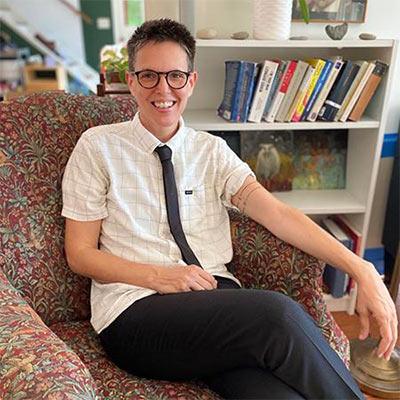
4. Outstanding Scholarship
The Haub School of Law has appointed Professor Noa Ben-Asher, JD, as the James D. Hopkins Professor of Law for the 2021–2023 term, in recognition of outstanding scholarship and teaching. The designation is considered to be among the Law School’s most significant faculty honors.
Since joining the Haub Law faculty more than 10 years ago, Ben-Asher has made significant contributions teaching torts, family law, and sexuality, gender, and the law. Additionally, their work has been published in prestigious journals including the Columbia Journal of Gender and the Law, Tulane Law Review, and many more.
5. This Fall on NBC…
There’s a new permanent cast member at Firehouse 51. Pace Performing Arts alumna Hanako Greensmith '18 has been made a series regular for her role as paramedic Violet Mikami on the NBC drama Chicago Fire. Tune in every Wednesday!
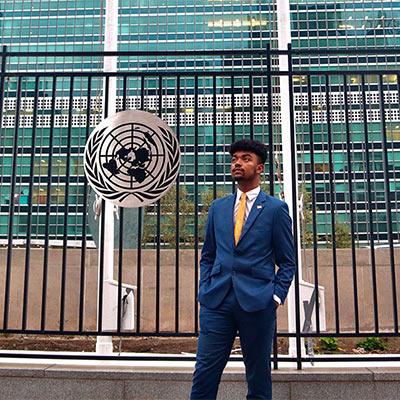
6. Addressing the United Nations
"I never thought I would find myself in this moment," said Jeremiah Williams '23. "Delivering a speech to the United Nations First Committee on behalf of civil society as I represent the youth of the world." On October 8, Jeremiah delivered the joint statement on youth engagement and peace, disarmament, and non-proliferation education at the United Nations General Assembly's First Committee (Disarmament and International Security) meeting. "We have ambition and energy. But youth can only plead so much for our futures while power is held tightly," he said to the Committee. "It is time we are more meaningfully included in conversations about our lives." Watch Jeremiah's statement, which was co-authored by Taylor Mangus '23.
7. Empowerment Through Photos
School of Education Adolescent Special Education Teaching Fellow Erin Levfevre ’21 has a multitude of talents. In addition to being a full-time teacher, she is also an accomplished photojournalist with a powerful mission. Lefevre is the creator of Liam’s World, a project that documents the life of her younger brother Liam and aims to show “a more faithful portrayal of living with autism.” Each photo contains a caption handwritten by Liam, enabling him to tell his own story in hopes of inspiring others with disabilities to do the same.
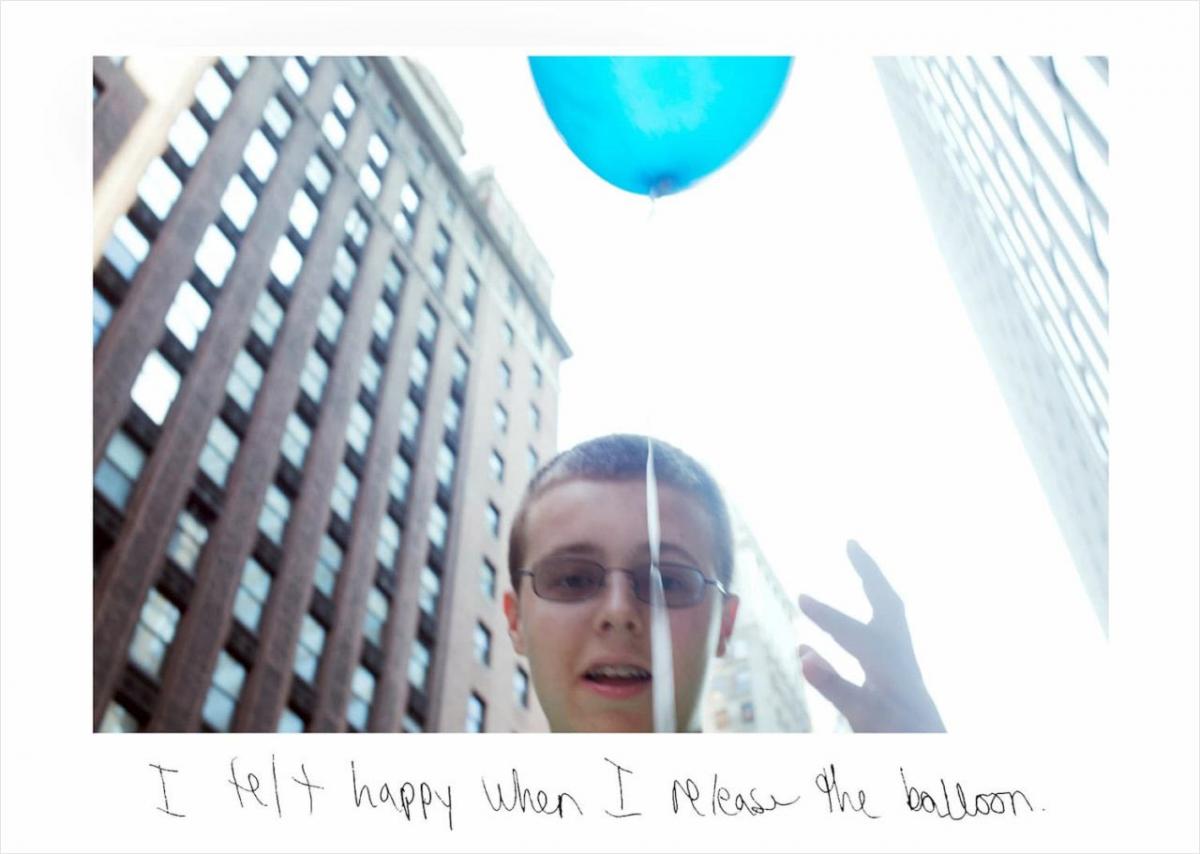
8. Pace’s First Juneteenth
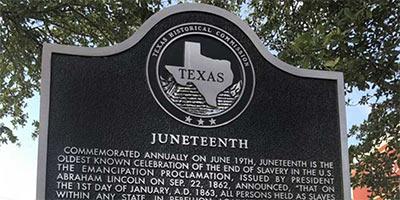
June 19, also known as Juneteenth, is a day commemorating the end of slavery in the United States. This year, Juneteenth was declared an official state holiday in New York and at Pace. As part of Pace’s recognition of Juneteenth, our Graduates of the Last Decade (GOLD) hosted a special virtual event on diversity, equity, and inclusion featuring special guest speaker and moderator, Ericka Riggs, chief diversity, equity, and inclusion officer at Omnicom Specialty Marketing Group.

9. Pace in Fashion
Beyoncé was spotted in Brooklyn this summer wearing a gorgeous design by Pace alumnus Telfar Clemens, the powerhouse behind TELFAR, a unisex fashion line he established in 2005 while still a student at Pace. Telfar has been getting much-deserved national and international attention for his accessible, genderless, forward-thinking fashion. His signature Telfar Shopping Bag, which is made using vegan leather and branded with a recognizable T, is known locally as the “Bushwick Birkin” for its unique design—a must-have Brooklyn status symbol.
Recently, Telfar designed the official uniforms for the Liberian team at the 2021 Tokyo Olympics—proving his reach, his prowess, and his true talent.
10. Thank You, Hometown Heroes
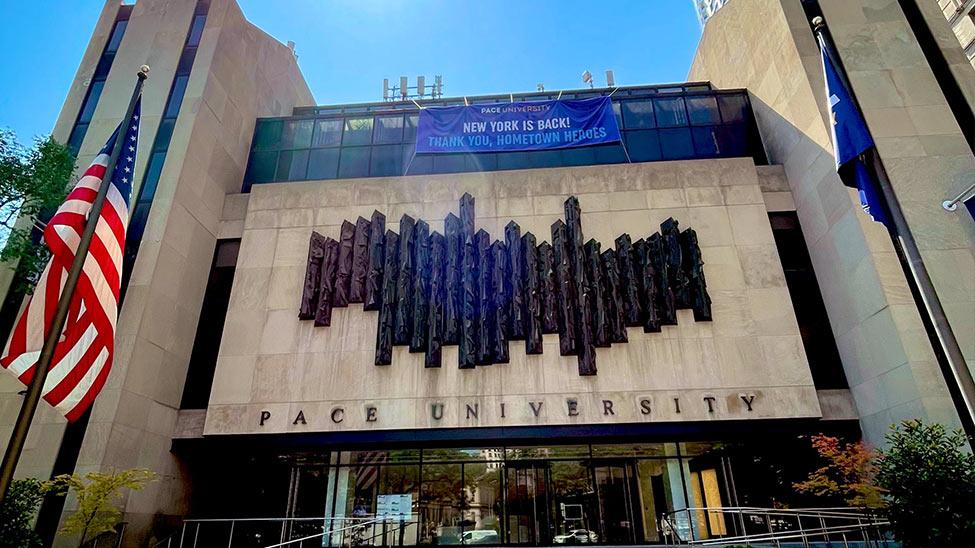
New York is back! On July 7, NYC hosted a ticker tape parade to honor the frontline healthcare staff, essential workers, and first responders who served our community through the COVID-19 pandemic. Participants marched up the “Canyon of Heroes,” or Broadway, early in the morning with a ceremony culminating in City Hall Park just across from the Pace NYC Campus. Members of the Pace Community celebrated under a special banner reading “Thank You, Hometown Heroes,” and watched the parade from 41 Park Row. It was a special time for all of us affected by these unprecedented times.
More from Pace Magazine
Twenty years ago, the Pace Community lost 47 members—students and alumni alike—and was closed for several weeks as we worked toward recovery. To mark the solemn occasion, we asked members of the Pace Community to share their experiences and recollections of the day and the time after.
With a $3.8 million grant from the National Science Foundation, Seidenberg is primed to train the next generation of cybersecurity leaders.
At the intersection of Pace’s strategic priorities and opportunities for outstanding academic growth comes the drive to move Pace forward. We're meeting the challenges facing higher education and putting our unique positioning and competitive advantages to work, strengthening our reputation as we move into the future.
Times Union Online featured Peter Riley, director of Veterans Services at Pace University in “Duty Calls: New commanders leading military units”
Riley has earned a Legion of Merit, a Bronze Star Medal and a Meritorious Services Medal. As a civilian, he is veterans services director at Pace University.
The Associated Press featured Haub Law Professor Michael Mushlin in “Texas executions face delays over religious rights claims”
Pace Haub Law Professor Michael Mushlin commented about execution delays in Texas over religious rights claims, saying it’s likely the Supreme Court will issue a ruling on two specific issues, but broader rulings are unclear.
GovInfoSecurity.com featured Seidenberg Dean Jonathan Hill in “US DOJ to Fine Contractors for Failure to Report Incidents”
Dr. Jonathan Hill, dean of the Seidenberg School of Computer Science and Information Systems at Pace University, tells ISMG, "This announcement is certainly an incentive to get companies to come forward with information. Sharing real-time experiences of attempted infiltration of computer systems can help protect others from enduring a similar fate."
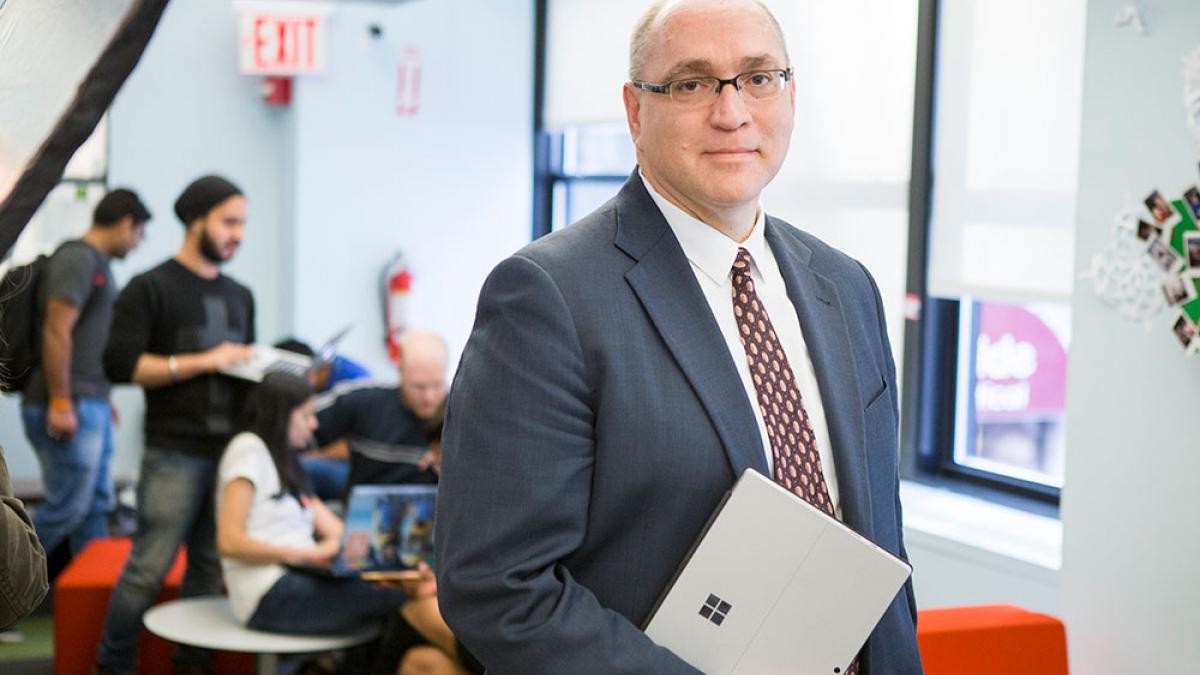
Forbes featured President Marvin Krislov’s latest piece: “Higher Education Partnerships Can Be A Win For Students And Businesses And The Community”
Recently, Pace University released our first-ever Pace Business Poll. It was a deep look at business conditions in the New York City metro area, where we have campuses in lower Manhattan and Westchester County.
Pace University Offers PhD in School Psychology
Pace University is adding an advanced degree to its offerings --- a new doctoral program in School Psychology on its New York City campus. The Department of Psychology launched the program this fall, in part, to meet the growing demand for school psychologists.

Pace University is adding an advanced degree to its offerings --- a new doctoral program in School Psychology on its New York City campus.
The Department of Psychology launched the program this fall, in part, to meet the growing demand for school psychologists. With a greater awareness of mental health and the importance of supporting students emotionally, socially and academically, school psychologists play an important role in learning. In fact, the Bureau of Labor Statistics projects the field to grow by 8 percent over the next decade.
“The PhD in School Psychology is an invaluable degree that prepares skilled professionals to meet the needs of the public,” said Tresmaine R. Grimes, dean, Dyson College of Arts and Sciences and School of Education. “With a special focus on the developmental processes of children and youth within the context of schools, families, and other systems, this program will provide our graduates the training and knowledge required to address a range of psychological services that serve as an integral component in support of the mental well-being of our children, which is greatly needed in today’s world.”
Housed in the Dyson College of Arts and Sciences, the program is designed to train school psychologists who are equipped to assume leadership, academic and research roles within the field. The program will train students to conduct research, provide indirect service delivery in areas such as preventive mental health and program development and evaluation, and function as doctoral-level school psychologists. It is designed to provide education and training in school psychology within a scientist-practitioner model.
“Graduates of the program will be critical forces in identifying the mental health needs of youth, families, and schools during and after the COVID-19 pandemic,” said Anastasia Yasik, PhD, program director and psychology professor. “They will not only be equipped to identify risk but will also be skilled in establishing and evaluating programs to address these risk factors. In addition, our graduates will be key players in combatting issues of social injustice within schools and communities.”
“I decided to pursue Pace University’s PhD in School Psychology because of the resources they provide to prepare students for the field and the opportunity to learn from renowned faculty,” said Ji Hoon Park, first-year student. “With their extensive experience and knowledge, Pace faculty help students integrate their interests into thesis and dissertation topics that are relevant to current trends in research.”
These doctoral-level, licensed school psychologists will be called upon to develop prevention as well as intervention services, provide supervisory services, and consult with educators, other healthcare providers, and parents. The program’s curriculum will provide students with the education, experience, and training necessary to provide first-rate school psychological services.
Students will gain the skills to address educational and developmental problems bearing upon school achievement, adjustment, specific disabilities/disorders, chronic or acute situations or conditions that influence learning or mental health, school crises, and difficult social conditions that elevate risk to healthy development. The program prepares students to develop competencies in psychological assessment, measurement, and intervention, act in accordance with professional values consistent with the highest ethical standards, properly use and benefit from supervision, and implement evidence-supported practices in intervention.
Through the promotion of research and scholarship by faculty and students, the PhD in School Psychology program will broaden the scope of knowledge in school psychology by addressing individual, group, and system issues along with biological, developmental, environmental, psychological, and social factors affecting well-being. The program emphasizes scientific research pertinent to the recognition of distinctions among, and effective preventions and interventions for, young individuals facing the many types of risk that compromise developmental potential. Graduates will also be equipped to analyze efficacy in the educational system, as well as pediatric healthcare and other systems, and to inform policy creation in education and mental health care.
Graduates of this program will have opportunities for professional careers in teaching, research, and educational settings. They also will be qualified to function as licensed psychologists and certified school psychologists.
The PhD Program in School Psychology joins the Psychology Department’s long-standing, highly regarded, APA-accredited PsyD Program in School-Clinical-Child Psychology and recently approved PhD in Clinical Psychology (Health Emphasis). The PhD program is open to applicants with a bachelor’s degree or master’s degree who show evidence of potential to excel in realms of scientific research and practice.
For more information about the program, visit the website. To learn more, please contact the Office of Graduate Admissions at (212) 346-1531.
About Dyson College of Arts and Science’s Department of Psychology (NYC)
A leader in the field of education and professional training, the Department of Psychology (New York City downtown campus) offers a Bachelor of Arts in Psychology, and an MA in Psychology with three research tracks: Behavioral and Social Sciences, Global Psychology, and Industrial and Organizational Psychology. An MSEd in School Psychology, as well as a PsyD in School-Clinical-Child Psychology, PhD in School Psychology, and a PhD in Clinical Psychology (Health Emphasis) are offered.
About Dyson College
Pace University’s liberal arts college, Dyson College offers more than 50 programs, spanning the arts and humanities, natural sciences, social sciences, and pre-professional programs (including pre-medicine, pre-veterinary, and pre-law), as well as many courses that fulfill core curriculum requirements. The College offers access to numerous opportunities for internships, cooperative education and other hands-on learning experiences that complement in-class learning in preparing graduates for career and graduate/professional education choices. Visit .
About Pace University
Since 1906, Pace University has educated thinking professionals by providing high quality education for the professions on a firm base of liberal learning amid the advantages of the New York metropolitan area. A private university, Pace has campuses in New York City and Westchester County, New York, enrolling nearly 13,000 students in bachelor’s, master’s, and doctoral programs in its Dyson College of Arts and Sciences, Lubin School of Business, College of Health Professions, School of Education, School of Law, and Seidenberg School of Computer Science and Information Systems.
Decolonizing the Academic Calendar: How (Not) to Observe Columbus Day
Columbus Day isn’t on Pace’s academic calendar this year! However, notes Professor Stephanie Hsu, neither is Indigenous Peoples' Day. At Pace, decolonization starts with our curriculum. Read more from Professor Hsu and learn about the Antiracist Education (ARE) core undergraduate requirement,currently in development, to address the educational gaps created by legislation banning critical race theory in a growing number of states.
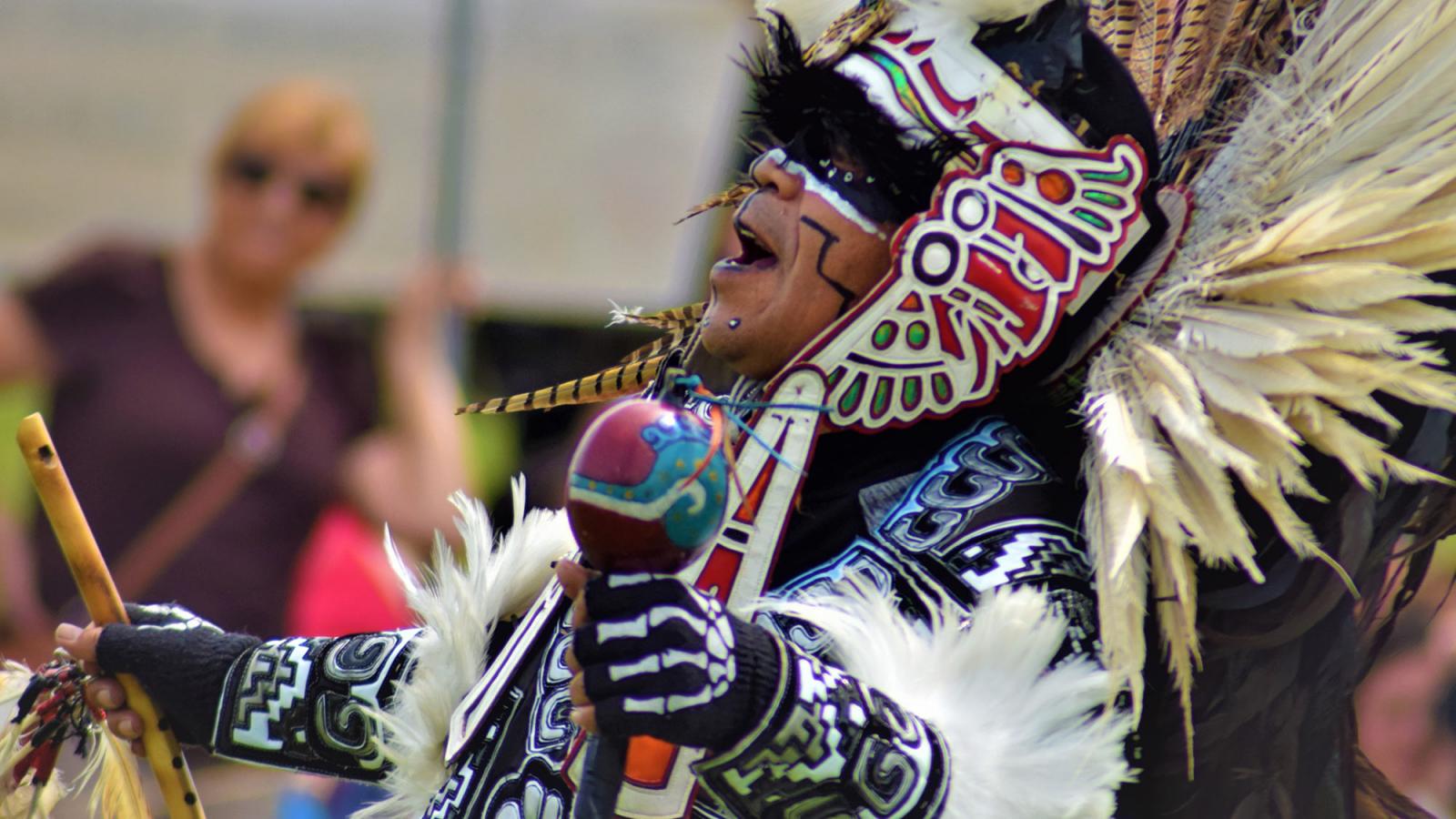
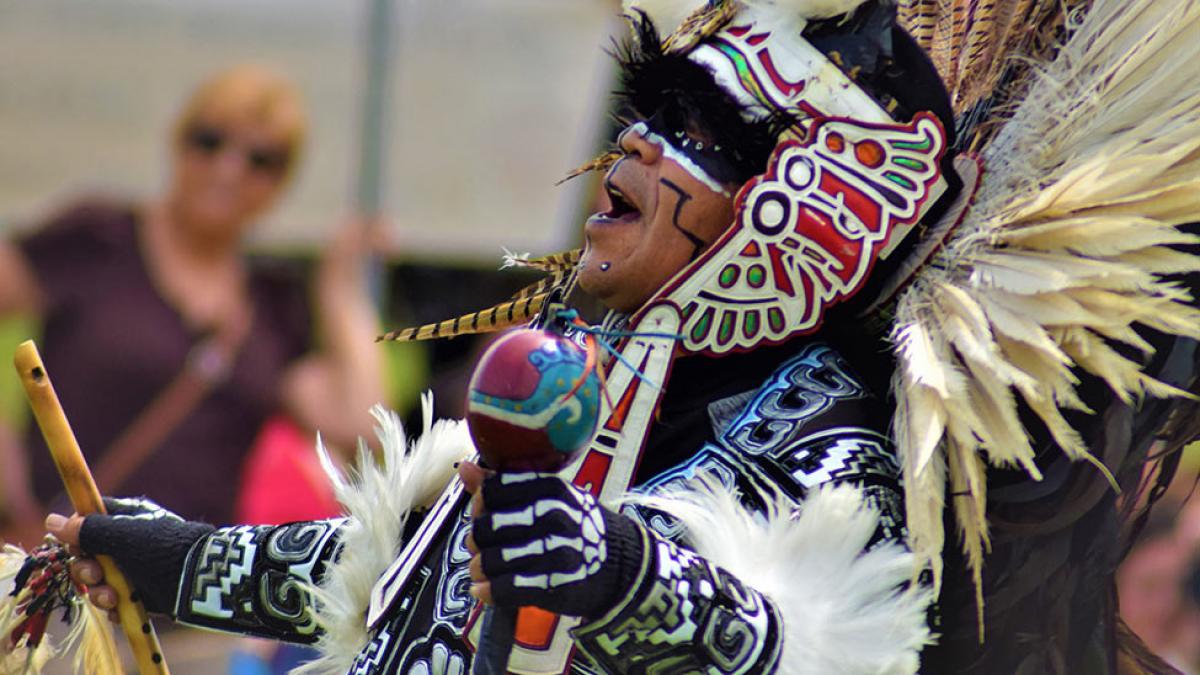
Columbus Day isn’t on Pace’s academic calendar this year! In fact, it was removed for the first time in 2019. It’s understandable if my colleagues haven’t noticed, because the University holds classes as usual on the second Monday of October, which has been a federal holiday associated with Italian American heritage since 1937. However, let me note that Indigenous Peoples’ Day isn’t on our University’s calendar, either. As another way of remembering the settlement and colonization of the Americas, Indigenous Peoples’ Day is what a growing number of individual states and municipalities have officially renamed this federal holiday since 1990. [1]
Of course, we could choose to remember Indigenous people every day by introducing into our campus culture the convention of the land acknowledgment, a public statement that “inserts an awareness of Indigenous presence and land rights in everyday life.” [2] It names our relationship to the people whose traditional lands we occupy, and it typically includes an event- or audience-specific reflection on the meaning or challenge of decolonization in the immediate context.
Pace University is located on the unceded land of the Lenape people. We acknowledge the Lenape community, their elders past, present, and emerging, and that our work is situated on the island of Manhattan (Menohhannet or On the Island), traditional lands of the Munsee Lenape, the Canarsie, Unkechaug, Matinecock, Shinnecock, Reckgawanc and the Haudenosaunee Confederacy. We respect that many Indigenous people continue to live and work on this island and acknowledge their ongoing contributions to this area. This acknowledgement is part of our commitments to dismantle the ongoing legacies of settler colonialism and white supremacy. [3]
This land acknowledgment has been developed by Dyson Associate Professor Emily Welty, PhD, who directs our Peace and Justice Studies program, drawing on the work of the Safe Harbors New York City Indigenous Collective (SHNYCIC), whose decolonizing mission for the world of theater and the performing arts starts with rebuilding our relationships to Native artists and communities. In our case, the complexity of our relations to Indigenous land begins with the displacement of the Lenape people from Pace’s environs by William Penn and other Quaker settlers in the 17th century. Their diaspora survives today as the Delaware Tribe of Nations in Oklahoma and Kansas, the Delaware Nation in Oklahoma, the Stockbridge-Munsee Band in Wisconsin, and the following First Nations in Ontario: the Munsee-Delaware Nation, the Delaware Nation at Moraviantown, and the Delaware of Six Nations. Lenape communities that have not been federally recognized include the Ramapough Lenape Nation and the Nanticoke Lenni-Lenape Tribal Nation in New Jersey, and the Lenape Nation of Pennsylvania.
Imagining what decolonization could mean at Pace has begun with our curriculum: a new course in Native and Indigenous Peoples Studies created by artist and educator Ty Defoe (Giizhiig, Ojibwe, and Oneida Nations) is now being offered every semester. It’s part of the Critical Race and Ethnicity Studies track of our American Studies program, which partners with Latinx Studies, African and African American Studies, and Global Asia Studies on campus in teaching students that critical thinking about race/ethnicity does not pursue “correct” answers, expect easy solutions, or rest on received knowledge. Together with programs such as Peace and Justice Studies, we are currently developing an Antiracist Education (ARE) core undergraduate requirement to address the educational gaps created by legislation banning critical race theory in a growing number of states.
Indigenous Studies started emerging in universities around the world in the early 2000s, and it changed how colonization was understood in the previous century. As Lorenzo Veracini explains it, “if I come and say: ‘you, work for me,’ it’s not the same as saying ‘you, go away.’ This is why colonialism is not settler colonialism.”[4] As opposed to the Indian subcontinent where the British ruled and then left, the “India” that Columbus thought he’d found in the Caribbean (or West Indies) was settled thoroughly, and the original inhabitants of the land were made to “go away” through policies of genocide and physical displacement by immigrants and forced migrants in patterns of occupation that continue in this hemisphere today.
In the words of one of my students, Janvi, an Art and American Studies double major, learning about Indigenous Studies at Pace has “expanded on my personal spiritual views. I was intrigued to learn about Mahu and Two-Spirit people, how sexuality and intimacy are respected and taught, and their views on earth and healing.” Abby, another student studying Musical Theater at Pace and taking an introduction to critical race theory with me, says that what “changed my perspective the most is learning how the US lumps Indigenous peoples into the idea of multiculturalism.”
As an example of the weighty lesson that Abby phrases with such clarity, and as an illustration of the challenge that Indigeneity poses to politics-as-usual, let me share a real exchange with a fellow professor—someone I describe as a conscientious and reliable white ally to people of color. Wanting to expand the social justice impact of our land acknowledgment, this professor suggested that we also mention our campus’s proximity to the African Burial Ground, a national monument marking the gravesites of more than 400 free and enslaved people of African descent unearthed with downtown construction in 1991. While I feel that recognizing anti-Black racism is a daily essential, I decided to encourage this coworker not to add anything to our land acknowledgment that might take the emphasis off Indigenous land rights. Even their symbolic recognition can prove controversial, disruptive, and revealing in important ways, as we learned when a recent proposal to open faculty meetings with a land acknowledgement was voted down by colleagues who worried that officially mentioning Indigenous land rights could expose our university’s real estate holdings to future liability.
Critical Race and Ethnicity Studies scholars today are more resistant than ever to blurring the distinctions between this nation’s relationship to stolen bodies and the stolen ground in which they are buried. Black and Indigenous scholars respectively have observed that an ethic of multicultural inclusion cannot hope to redress or repair the non-ontological status—or the political nonexistence—of Blackness and Indigeneity. Afro-pessimism names such a school of thought that has flourished across academia, the art world, and activist discourse, and which creates powerful conversations in Pace classrooms today. The civil society we seek to perfect, and which disproportionately fails people of color, is dependent on the ongoing colonization of Indigenous people on the American continent, in the Caribbean, and in the Pacific. These injustices are neither equivalent nor comparable, and we should question under what circumstances or from whose standpoint they can be mentioned in one breath.
While we may have retired Columbus Day from the academic calendar, we’ve also gained another symbolic holiday in the form of Veterans’ Day, which is always November 11. There’s a neat parable for American Studies here: Notice how over-determined or, in other words, how easy the shift from honoring those sacrificed in America’s wars to remembering that the frontier was the first front line, and Indianness is both alive and dead in US military culture (e.g., Tomahawk missiles, Apache helicopters, “in[dian]-country”).[5] What we might mistake for an abstaining silence on the status of Indigenous Peoples’ Day on our calendar turns out to be an opening for acknowledging Indigeneity daily, because as First Nations hip-hop artist Drezus (Plains Cree) tells us, decolonization is also a culture war that needs us all combat-ready.
About the author: Stephanie Hsu is an associate professor of English and program director of American Studies at Pace University; a board member of Kyoung’s Pacific Beat peacemaking theater company; an editorial collective member of the Q+ Public book series with Rutgers University Press; and a co-founding member of Q-WAVE, a grassroots organization for queer women and trans people of Asian/Pacific Islander descent in New York City.
Footnotes
- For the first time this year, the New York City Department of Education is jointly recognizing “Italian American Heritage/Indigenous Peoples Day.”
- “Territory Acknowledgment,” Native Land Digital
- Thanks to Dr. Emily Welty for permission to share this land acknowledgment which draws on the work of SHNYCIC, and to Linda Chapman of the New York Theater Workshop for sharing their work.
- Lorenzo Veracini, “Introducing Settler Colonial Studies,” Settler Colonial Studies 1 (2011): 1.
- See chapter 4 of Roxanne Dunbar-Ortiz’s An Indigenous Peoples’ History of the United States (Boston: Beacon Press, 2014), 56–77.
Header image from the Nanticoke Lenni-Lenape 40th annual pow wow.
